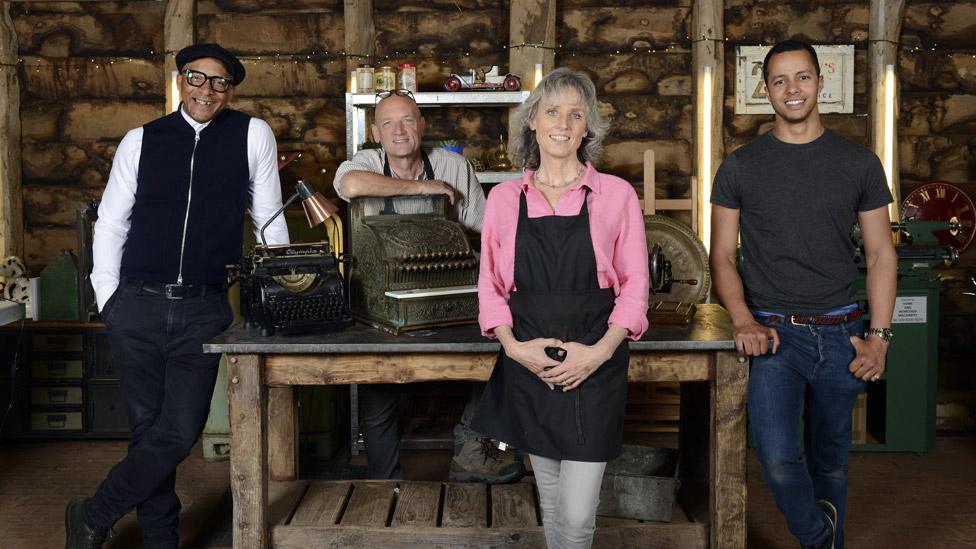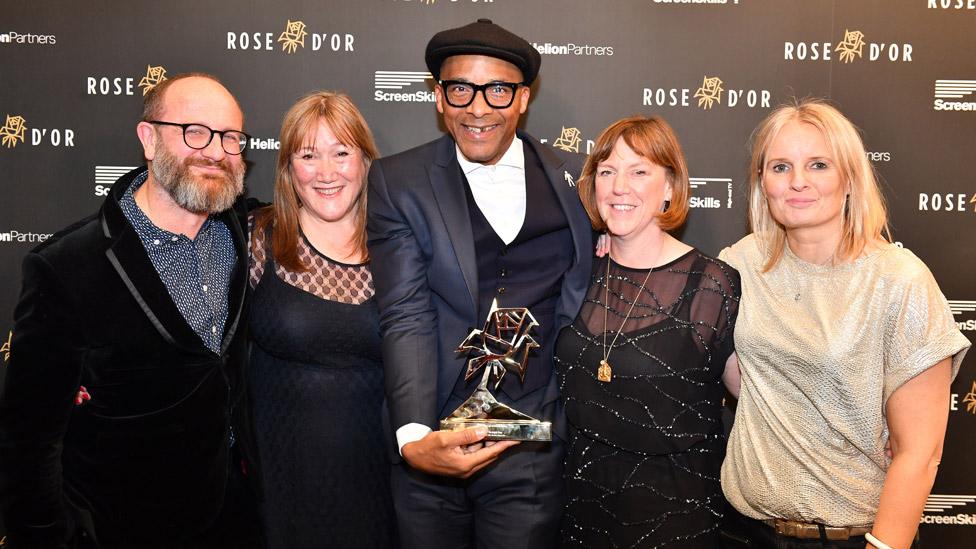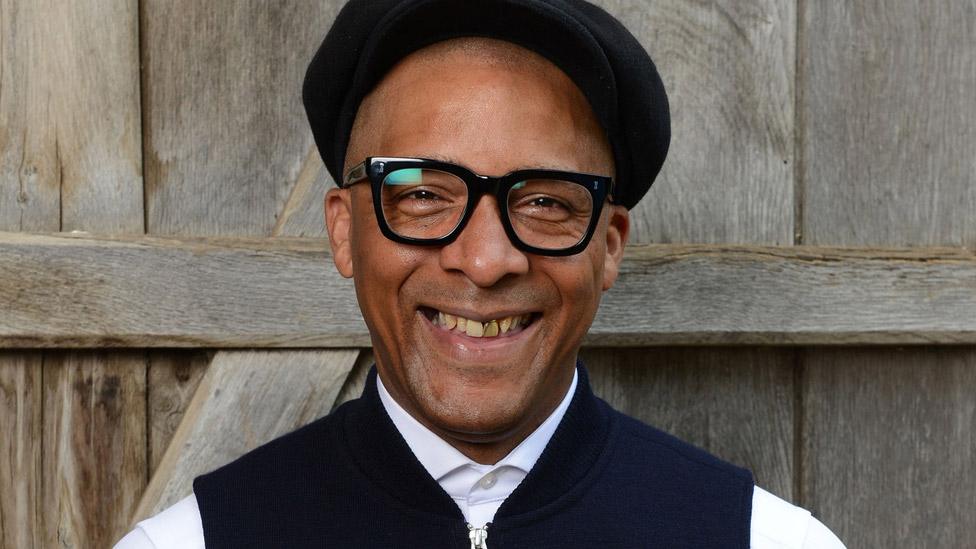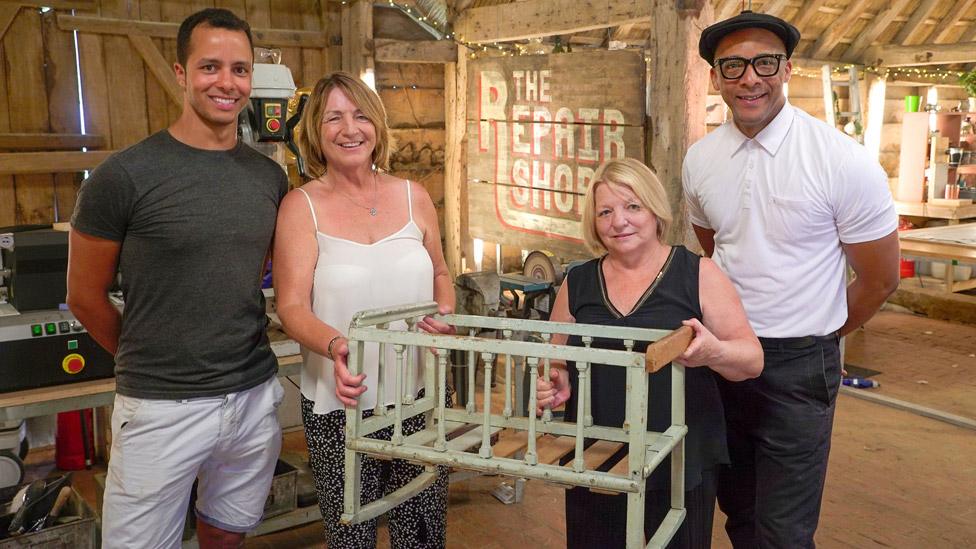Jay Blades: From repairing lives to hosting TV hit The Repair Shop
- Published

Jay Blades (left) with some of The Repair Shop's resident restorers
BBC One's The Repair Shop has become one of the unlikely TV hits of recent years - and host Jay Blades has become one of TV's unlikely stars.
On the surface, the idea behind The Repair Shop is so simple that it could sound dull.
People bring their dilapidated old possessions and heirlooms to a barn, where a group of experts restore them. Then the owners come and get them.
There's much more to it, though. The Guardian has described it as, external "the most moving show on TV", while Stephen Fry has called it, external "far and away the best programme on British television".
The reason the show is such a success - watched by 6.7 million people after moving to a primetime slot for its sixth series in March - is because the objects invariably come with their own emotional baggage.
Allow YouTube content?
This article contains content provided by Google YouTube. We ask for your permission before anything is loaded, as they may be using cookies and other technologies. You may want to read Google’s cookie policy, external and privacy policy, external before accepting. To view this content choose ‘accept and continue’.
Take last week's episode. Widower Geoff brought in his broken jukebox, which had played the first dance at his wedding many years ago. When he returned to the barn and heard the strains of the song play once more, he was moved to tears.
As were most people at home, if the reaction on Gogglebox is anything to go by. On the Channel 4 show, an emotional Pete in Blackpool neatly summed up The Repair Shop's appeal: "It's just nice, isn't it?"
The man who put his arm around Geoff as the jukebox played was The Repair Shop host Jay Blades.
"It's unbelievable how the audience have taken to it," he says. "I kind of knew it was going to be successful, but I didn't know it was going to be this successful."
When it began in 2017, the show attracted around a million viewers at tea time. Now it has been promoted in the schedule and has won a string of awards. Not since The Great British Bake Off has a show become such a sleeper hit.

Blades picking up the Rose d'Or award for best reality and factual entertainment programme in December 2019
At a time when many people are craving comfort TV - as well as a less disposable, slower and kinder life - its mix of practical solutions and heartwarming tales has hit the target.
The host himself is particularly touched when men like Geoff are moved by a repair. "I admire people that come into the barn because some of the stories that are attached to the items are very personal, and some of them are raw," he says.
"I love it, and I get quite choked up when I hear men being emotional, because where I'm from, men were never emotional. It was just like, 'If you show emotion, you've shown your weakness and you then become a kind of victim because people will take the mickey out of you.'"
Where Blades comes from is Hackney in east London, and a TV career was never part of his plan.
The job on a furniture repair show has come about after he first did his bit to try to repair police racism - which he experienced first-hand - as well as broken communities and young peoples' prospects.

Blades went to university to study criminology and philosophy at the age of 30
After leaving school at the age of 15 with dyslexia and no qualifications, Blades did a succession of what he calls "little jobs". But at the age of 30, he decided to go to university.
"I wanted to set myself a challenge of doing something that I didn't like, which was school," he says. "I didn't like school for a number of reasons. I was bullied and there was a lot of racism, and there's a lot of fighting I had to do at school."
He phoned a university and asked what courses they had on offer. He told them he was interested in fashion. What else?
"I said, 'Well, I grew up in a poor area, and I know about crime and stuff like that.' And they said, 'Well, you could study criminology.'"
He asked what that was, and was told it's the study of why people commit crime. He responded: "Really? Wow. I'd like to know why people do crime because my area was full of crime."
'I used to get beaten up by the police'
While at university in Buckinghamshire, he took part in race relations training with police - and took the opportunity to give them a piece of his mind.
"I was telling them how they're policing ethnic minorities and they've got it all wrong, because they were very heavy-handed," he recalls. "I didn't know I was chatting to the chief superintendent of Thames Valley Police! He said to me, 'I admire your bravery. No-one's ever told me about this the way that you told me.'"
Ch Supt David McWhirter commissioned Blades to survey young people in deprived areas in Oxford about their concerns, and feed the responses back. He then did the same in other nearby towns.
"He was the first police officer I've ever met who has kept his word with me, because we made some groundbreaking changes in the deprived areas in Oxford that I am super proud of," Blades says.
"That guy restored my faith in the police, because I used to get beaten up by the police back in the 80s. The SPG [Special Patrol Group] vans used to pick me up and beat me up and throw me out and stuff like that. But he was a good man."

Blades with restorer Will Kirk (left) and two Repair Shop customers
That led Blades and his wife to set up a charity called Street Dreams to work with young people in the area, which led to another called Out of the Dark.
"There was a group of young people who weren't necessarily good at academic work, but they were really good with their hands," he says.
At that point, Blades still knew nothing about furniture restoration. That changed when he put a call out for local retired people who wanted to pass on their skills.
"I had a number of members of the community come in and teach us how to do restoration, using a chisel, using a saw, how to paint - loads of stuff. Our oldest teacher was a 91-year-old who taught us how to do caning of a chair."
Blades himself began teaching young people how to transform objects they had dismissed as junk - giving them not only practical skills but also lessons about waste and finance.
"I would say to them, 'I'm not going to teach you how to restore old furniture. I'm going to show you how to make money from nothing.'"
After The Guardian made a film about his project in 2014, external, he came to the attention of TV producers and was asked to be a host of a new show - called Money For Nothing - which rescued and renovated unwanted items.
That in turn led him to The Repair Shop, and to be watched by 6.7 million people a week.
"In the current climate, I think we all need something to look forward to, something that will just kind of restore our faith in humanity," he says.
The Repair Shop is on BBC One on Wednesdays at 20:00 BST and on iPlayer.